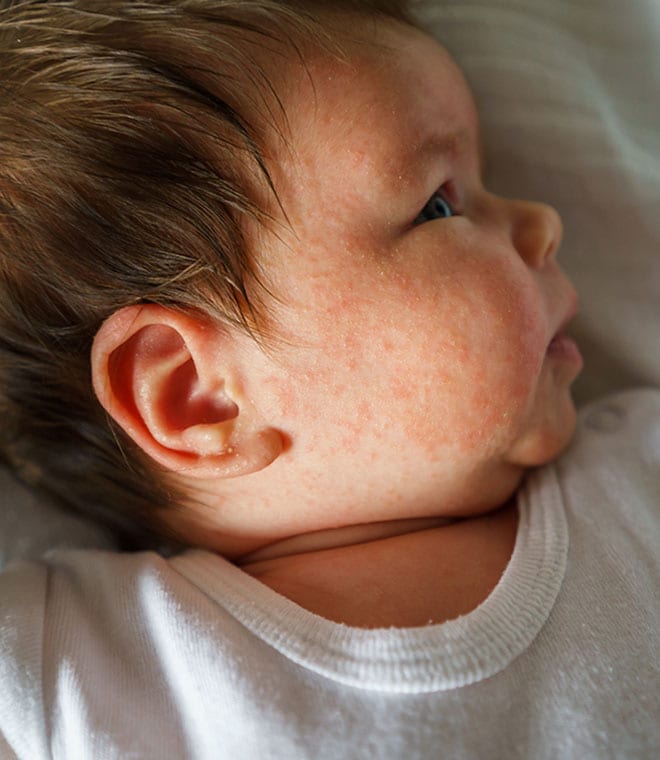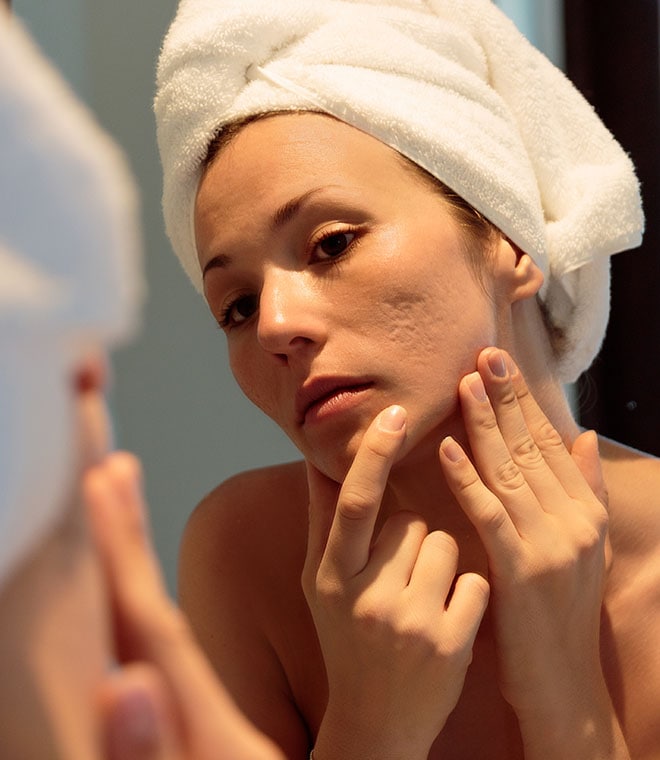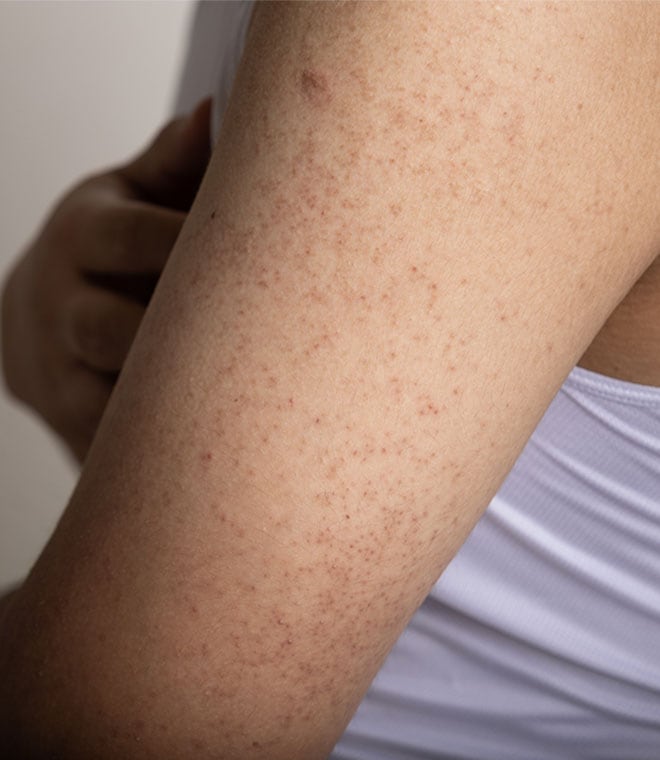Health
What is eczema?
By Anna H. Chacon, MD, Fellow of the American Academy of Dermatology Jul 25, 2023 • 7 min
More than 31 million people in the U.S. have eczema. Generally, eczema is the term for conditions that result in the formation of itchy, inflamed skin. Although people often think of eczema as a single medical condition, there are actually several types of eczema.
Atopic dermatitis
One of the most common forms of childhood and baby eczema, atopic dermatitis causes dryness, itching and inflammation. Although it usually begins during childhood, the symptoms can start at any age.
The dryness and scaling associated with atopic dermatitis often develops in places where skin flexes, such as the inside of the elbows and behind the knees. However, it can occur in other places, like the arms, lips, ears, nipples, breasts, eyelids and scalp.
Contact dermatitis
Most people will develop contact form of dermatitis at least once in their lives. It happens when you come in contact with something that triggers an allergic skin reaction, resulting in a rash that appears in the affected area, such as the face or legs.
Dyshidrotic eczema
This type of eczema causes itchy blisters to form on the hands and/or feet. Typically, triggers such as hot temperatures, sweating and stress may cause flare-ups. You might also develop the rash when exposed to ingredients in personal care products or metals like cobalt or nickel.
Another form of eczema, neurodermatitis causes small patches of intensely itchy skin. Scratching or rubbing can result in open sores that bleed. This condition commonly develops on the ankles, hands, wrists, elbows and the back of the neck. Some people may also get patches around their genitals, such as on the labial skin around the vagina or on the penis and/or scrotum.
Discoid eczema
Also known as nummular eczema, discoid eczema is a form of eczema that often develops on very dry skin or after a skin injury, such as a scrape or bug bite. The main symptom is the formation of itchy, raised round or oval-shaped spots that may clear up and then reappear in the future. Although it can occur anywhere, nummular eczema is most common on the forearms, lower legs and hands.
Stasis dermatitis
Sometimes called gravitational dermatitis, varicose eczema or venous eczema, stasis dermatitis typically develops in older adults. It occurs when the valves in blood vessels in the lower legs grow weak. Reduced blood flow to the area results in skin swelling and discoloration. Varicose veins often accompany stasis dermatitis.
What does eczema look like?
Each form of eczema has its own characteristics, and how the rash associated with eczema looks depends on skin tone. People with darker skin may develop a gray, brown or purple rash. Eczema often appears purple, pink or red on lighter skin.
Is eczema an autoimmune disease?
Eczema isn’t an autoimmune disease, which is a medical condition that occurs when the immune system mistakenly attacks healthy cells, organs or tissues.
While eczema doesn’t develop due to an attack from the immune system, some forms are linked to the immune system. For example, contact dermatitis is an allergic skin reaction, and allergies occur when the immune system identifies a harmless substance, called an allergen, as a threat and releases chemicals to protect the body. These chemicals give rise to the inflammation associated with contact dermatitis.
Other potential causes of eczema include:
- Genetics: If someone in your family has eczema, you’re more likely to develop the condition.
- Environment: Exposure to hot weather, dry conditions, and smoke and other pollutants can raise the risk for eczema.
- Mental health concerns: Stress, anxiety and depression may lead to more frequent eczema flare-ups.
Is eczema contagious?
No, eczema isn’t contagious. Many people with eczema worry about the possibility of giving the condition to someone else. However, you can’t spread the condition to others, even with close skin-to-skin contact.
Psoriasis vs. eczema
Rashes caused by eczema and psoriasis can both look like patches of itchy, raised skin. However, these conditions are not the same. Psoriasis is an autoimmune condition that occurs when the immune system attacks cells and causes the body to produce skin at a faster than usual rate.
Eczema is not an autoimmune disorder and can occur due to genetics, environmental conditions, stress and other mental health concerns, or exposure to allergens.
What does eczema treatment involve?
Making changes to your skin care routine is often the first step in addressing eczema. Your healthcare provider will likely recommend that you apply moisturizer a few times per day, including after you bathe while your skin is still damp. You may also need to switch to gentler products to avoid harsh ingredients that trigger symptoms. Over-the-counter eczema treatments may also be helpful.
Keeping a symptom journal can be beneficial for people with eczema. By tracking what you do each day and making note of when you experience eczema outbreaks, you can potentially identify triggers and then take steps to avoid them.
In many cases, healthcare providers prescribe topical medications, like steroid creams and ointments, to address existing outbreaks. For more severe symptoms, an oral antihistamine or corticosteroid may be prescribed. Some people also benefit from light therapy or immunosuppressant drugs that regulate the immune system.
Which treatments are right for you will depend on your age, the type of eczema you have, the location of the rash, the severity of symptoms, your medical history and other factors. Your healthcare provider can recommend the best options for you and give you advice on how you can modify your skin care routine and lifestyle to manage eczema.
Updated July 2023.
Sources:
- https://nationaleczema.org/eczema/types-of-eczema/
- https://my.clevelandclinic.org/health/diseases/24299-atopic-dermatitis
- https://www.mayoclinic.org/diseases-conditions/atopic-dermatitis-eczema/symptoms-causes/syc-20353273
- https://my.clevelandclinic.org/health/diseases/9998-eczema
- https://www.aad.org/public/diseases/eczema/types
- https://www.pennmedicine.org/updates/blogs/health-and-wellness/2022/march/psoriasis
- https://www.aad.org/public/diseases/eczema/types/contact-dermatitis
- https://www.aad.org/public/diseases/eczema/types/dyshidrotic-eczema
- https://www.aad.org/public/diseases/eczema/types/neurodermatitis/symptoms
- https://www.aad.org/public/diseases/eczema/types/nummular-dermatitis
- https://www.aad.org/public/diseases/eczema/types/stasis-dermatitis
- https://medlineplus.gov/ency/article/000853.htm
- https://jamanetwork.com/journals/jamadermatology/fullarticle/2775575#
- https://www.uptodate.com/contents/nummular-eczema
- https://www.mayoclinic.org/diseases-conditions/neurodermatitis/symptoms-causes/syc-20375634
- https://www.aad.org/public/diseases/eczema/types/atopic-dermatitis/symptoms




